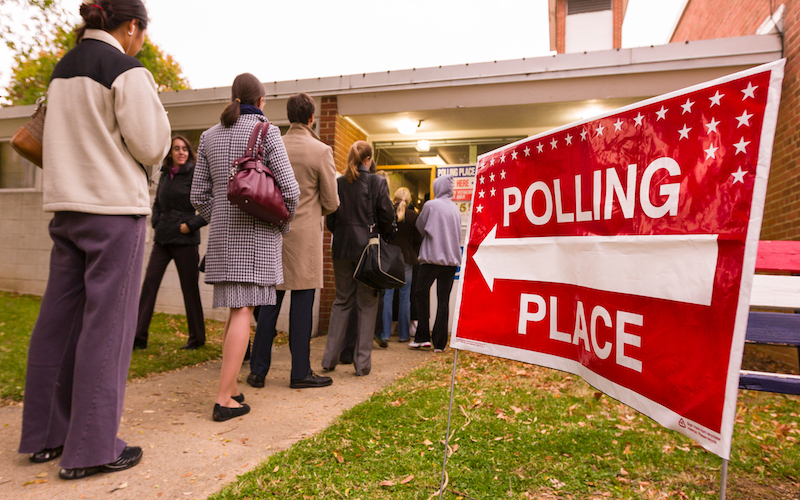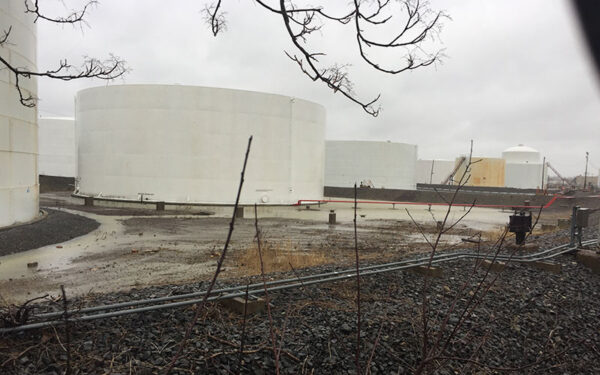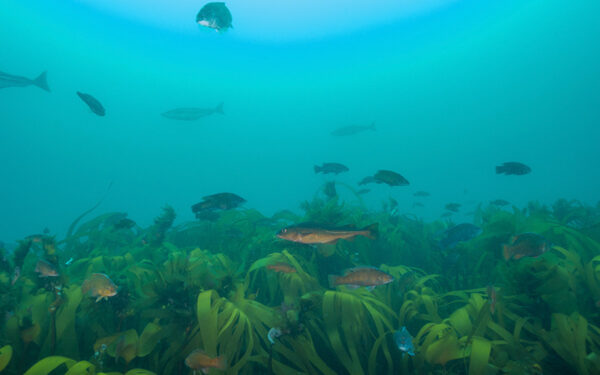
As presidential candidates continue to campaign in New Hampshire, the environment must be a priority for the 2020 election. Photo: Rob Crandall via Shutterstock
With the presidential primary season in full swing, New Hampshire – with its first-in-the-nation status – has taken its usual spot as a must-visit state for the candidates. At the same time, concerns about the climate crisis have reached unprecedented levels, and the environment has rightfully become one of the top 2020 election issues.
A number of urgent environmental issues must be tackled across the country, and the Granite State is no exception. Here in New Hampshire, a few specific issues deeply affect us, and it’s essential that we see the candidates address them while they are stumping throughout our communities.
Tackling the Climate Crisis
Already, we’re seeing the effects of a changing climate, and if we don’t act now to drastically curb our climate-damaging emissions, the impacts will be felt by families and businesses throughout New Hampshire in increasingly severe ways. In the face of dire warnings from scientists and international panels, the current administration is not only failing to make progress reducing carbon pollution, but it’s also intentionally taking us in the wrong direction, rolling back even modest environmental protections.
Just last week, the U.N. Intergovernmental Panel on Climate Change released a damning report highlighting the catastrophic impacts of the climate crisis on our oceans. And we all witnessed the inspiring work of activist Greta Thunberg mobilizing millions across the globe to go on “climate strike” and speaking truth to power at the U.N., where she chided world leaders for not doing nearly enough to stem emissions and respond to this emergency.
Our presidential candidates must make clear that tackling this existential threat to the planet and our communities is one of their highest priorities, and they should have clear, ambitious plans for achieving net-zero emissions no later than 2050.
This grim situation is also why it’s more important than ever for us to act at the state level to prepare for the impacts of climate change and curb our emissions while there’s still time. Cities and towns throughout the state have begun pursuing more clean energy solutions, but we need bold action at the state level if we’re going to avoid the most catastrophic outcomes.
Protecting Our Water and the Public’s Health
All of us in New Hampshire should feel safe when we turn on our taps. Unfortunately, our water in too many communities is under threat from toxic per- and polyfluoroalkyl substances (PFAS). Manufacturers have used these toxic chemicals for decades in a wide variety of products: nonstick cookware, stain-resistant fabrics, some firefighting foams, and even food wrappers. PFAS are linked to growth and learning problems in infants, as well as interference with natural human hormones, fertility, and the immune system.
PFAS have been found in drinking water, groundwater, and surface waters throughout the state, including at or near the Pease Tradeport and Coakley landfill on the Seacoast, and the Saint-Gobain Performance Plastics facility in Merrimack.
In addition to PFAS, lead also threatens our water. Recent sampling by schools and childcare centers, for example, shows the widespread presence of lead at levels that exceed the recommendation of the American Academy of Pediatrics. Our children should not be put at risk simply by going to school, and any level of lead exposure is a threat.
Incredibly, the federal government is failing to show needed leadership on these public health issues. For example, its failure to address PFAS has forced New Hampshire and other states to step up and take action. And the federal Safe Drinking Water Act still does not contain a standard for lead designed to protect the public health.
Protecting our drinking water – not to mention our lakes, rivers, and bays – must be a high priority for any candidate claiming to care about the health of our children and families.
Stemming the Plastic Pollution Tide
The plastic pollution problem is getting worse, and we can’t recycle our way out of it. Plastics pollute our environment at every stage of their life cycle – from oil and gas extraction to refining, manufacturing, and their eventual landfilling or incineration. Not to mention all the single-use plastics washing up on our beaches and choking our wildlife.
While states and communities are working to stem the tide of single-use plastics, it’s clear that the federal government can and must lead the way in solving this problem. Those seeking to be president in 2020 need to show they’re serious about taking on Big Oil and Big Plastic, which have every intention of maintaining the status quo.
Next Steps
We’re already feeling the impacts of the climate crisis. And increased inaction on environmental issues across the board at the federal level are compounding these issues. It’s encouraging that many of the candidates vying to be the next president have committed to making the environment a key priority this election season.
Now is the time for them to go a step further and explain how they plan to tackle these critical issues – issues that affect the health of our children, our communities, and our planet – and exactly what they want to achieve.



